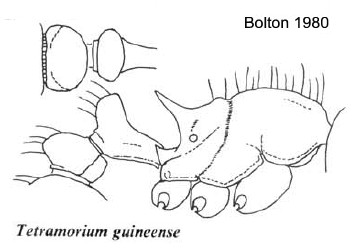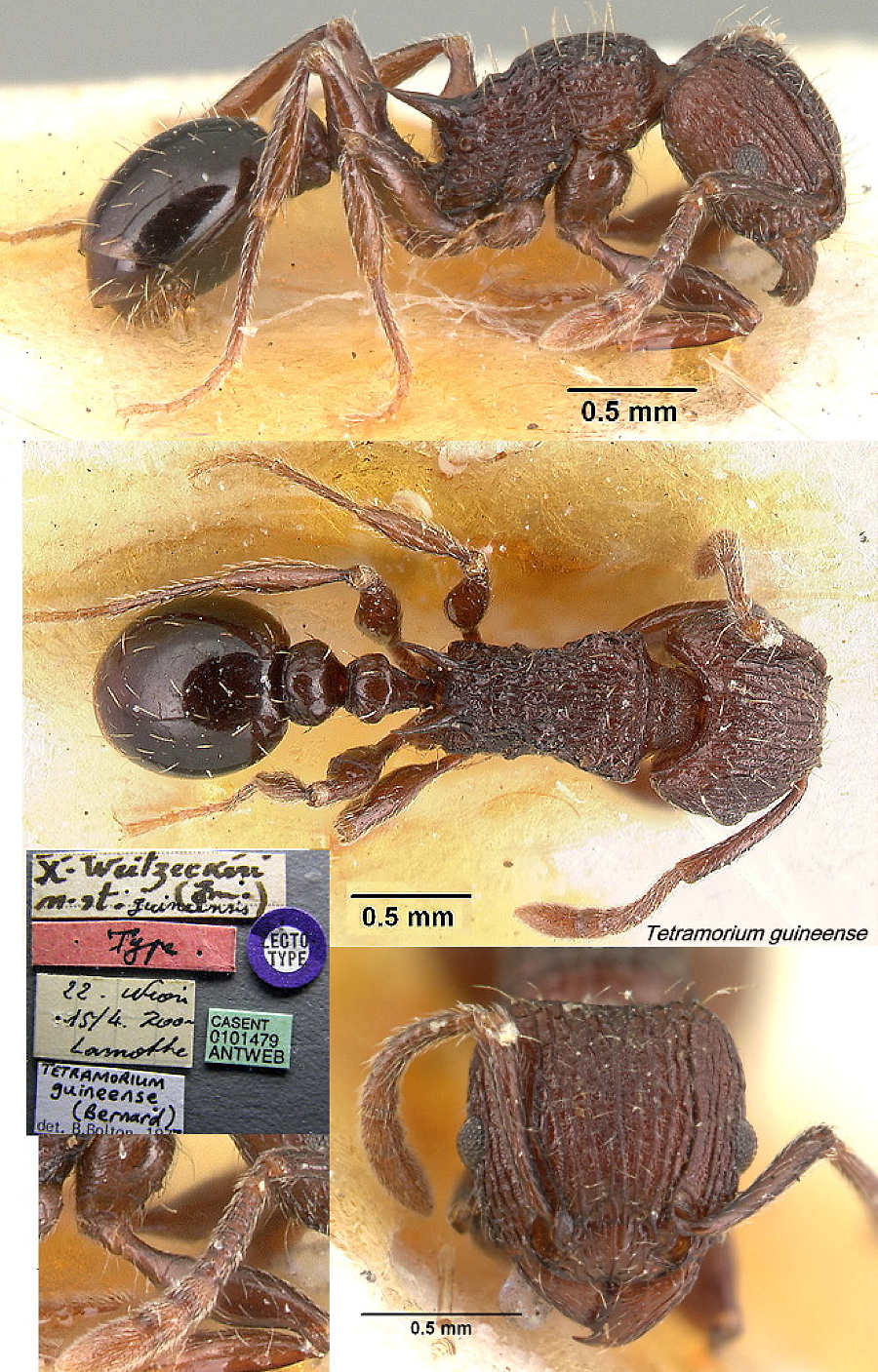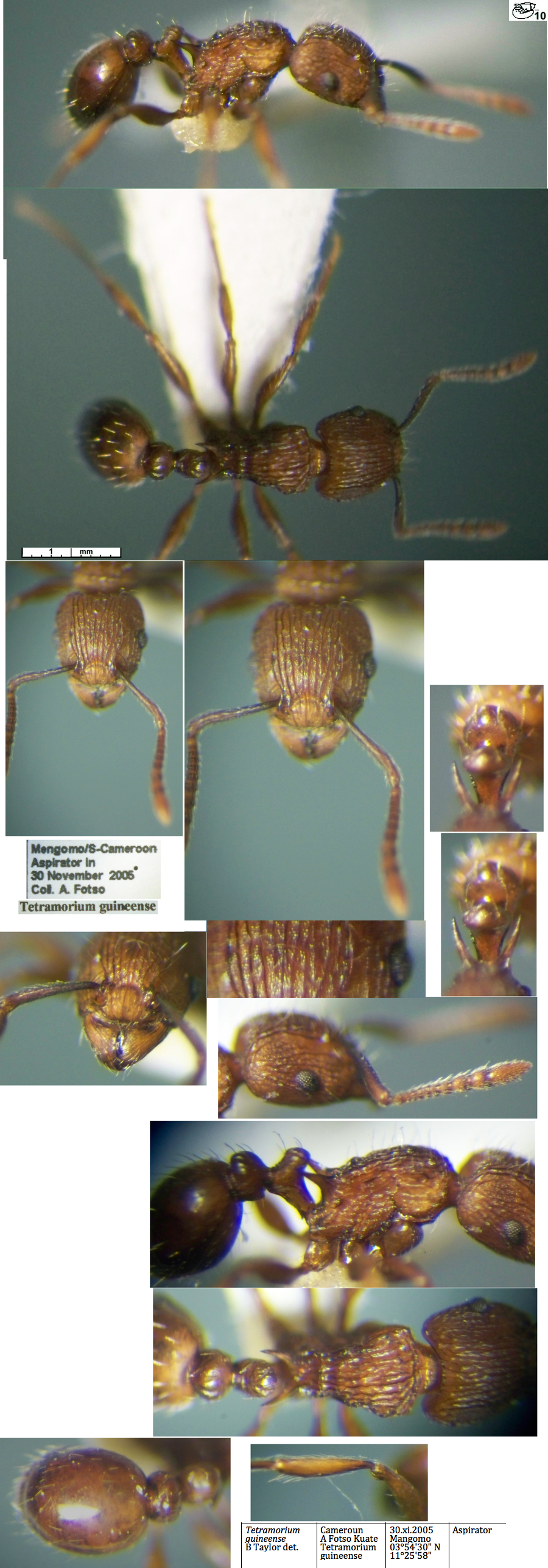Tetramorium guineense (Bernard)
  Type location Guinea (Xyphomyrmex
weitzeckeri Em., race guineensis n. sbsp., Bernard, 1952:
251, illustrated, worker) from Mt. Nimba, Nion Forest, at 700 m, one
worker (as Xiphomyrmex weitzeckeri race guineensis, by
Lamotte); also one worker from Nimba north-east forest by Villiers Type location Guinea (Xyphomyrmex
weitzeckeri Em., race guineensis n. sbsp., Bernard, 1952:
251, illustrated, worker) from Mt. Nimba, Nion Forest, at 700 m, one
worker (as Xiphomyrmex weitzeckeri race guineensis, by
Lamotte); also one worker from Nimba north-east forest by Villiers  . .
|
 Bernard's
limited note (1952) is at Bernard's
limited note (1952) is at  . Bolton's modern description (1980) is at . Bolton's modern description (1980) is at  . .
Note The "Tetramorium guineense" listed by
Wheeler (1922), as originally Formica guineensis Fabricius
1793, is defined as Pheidole
guineensis by Bolton (1977, see, Bolton, 1995).
WORKER - TL 2.9-3.7 mm; head with very coarse
reticulate-punctate ground sculpture, including in the antennal scrobe.
Postpetiole rounded in profile, much thicker than the petiole.
Postpetiole without a carina but with two deep concave impressions. All
dorsal surfaces with numerous elongate simple hairs. Colour deep glossy
brown or reddish brown, often the gaster darker, sometimes nearly black
(after Bernard, 1952; and Bolton, 1980, illustrated, alitrunk and
pedicel).
Included in the revision of Hita Garcia, Fischer &
Peters (2010). They confirm the variation in colour.
|
 The
photomontage of the holotype from Guinea is collated from http://www.antweb.org/specimen.do?name=casent0101479. The
photomontage of the holotype from Guinea is collated from http://www.antweb.org/specimen.do?name=casent0101479.
Bolton (1980) described it as only from the rain forest
zones of West and Central Africa. He listed findings from Liberia,
at Reputa (W.M. Mann); and Ivory Coast, at Divo (L. Brader) and
Tai Forest (T. Diomande). From Nigeria, he collected it at
CRIN, but no examples were in the CRIN collection.
Early Ghana findings were from CRIG (B. Bolton),
Begoro and Mt. Atewa (C. A. Collingwood), Kibi (D. Leston) and Kade (J.
Majer). Also as Tetramorium guineense?, in cocoa leaf litter and
once from his insolated canopy survey by Room (1971). Since found in
leaf litter by Belshaw & Bolton (1994b) in Ghana, where they
describe it as widespread (417 workers from 10 sites). Known as a tramp
species (Bolton & Collingwood, 1975).
Nests are constructed in rotten stumps or dead logs
still with bark, and workers forage on the leaf litter, being
predaceous and attacking any soft-bodied arthropods, including Pheidole
ants (Bolton, 1980).
|
Oxford University Museum
specimens
Tetramorium guineense
B Taylor det.
|
Cameroun
A Fotso Kuate
Tetramorium spJ
|
21.ix.2007
Awae II
03°54'30" N
11°25'58"
|
Quadrat in fallow
|
1
|
 |
Tetramorium guineense
B Taylor det. |
Cameroun
A Fotso Kuate
Tetramorium spO
|
17.i.2008
Awae II
03°54'30" N
11°25'58"
|
Quadrat in fallow
|
1
|
 |
Tetramorium guineense
B Taylor det. |
Cameroun
A Fotso Kuate
Tetramorium guineense
|
30.xi.2005
Mangomo
03°54'30" N
11°25'58"
|
Aspirator
|
1
|
 |
Tetramorium guineense
B Taylor det. |
Cameroun
A Fotso Kuate
Sample 59
|
28.vii.2010
Nko’ondo
03°54'30" N
11°25'58"
|
|
1
|
 |
Tetramorium guineense
B Taylor det. |
Central African Republic
P Annoyer
Camp 1C
|
12-18.x.2008
Dzanga-Sangha NP
03°03'58.3" N
16°08'59.6" E
|
Camp 1; 528 m; Ayous Barber campement
|
1
|
 |
|
 The photomontage
is of a specimen from Central
African Republic, Dzanga-Sangha NP; collector
Philippe Annoyer (CAR Camp 1). The photomontage
is of a specimen from Central
African Republic, Dzanga-Sangha NP; collector
Philippe Annoyer (CAR Camp 1).
|
 The
photomontage is
of a worker from Cameroun;
Nko'ondo; collector A Fotso Kuate (fk
unmounted 59); The
photomontage is
of a worker from Cameroun;
Nko'ondo; collector A Fotso Kuate (fk
unmounted 59);
|
 The
photomontage is
of a worker from Cameroun;
Mengomo; collector A Fotso Kuate (fk tetramorium guineense). The
photomontage is
of a worker from Cameroun;
Mengomo; collector A Fotso Kuate (fk tetramorium guineense).
|
|